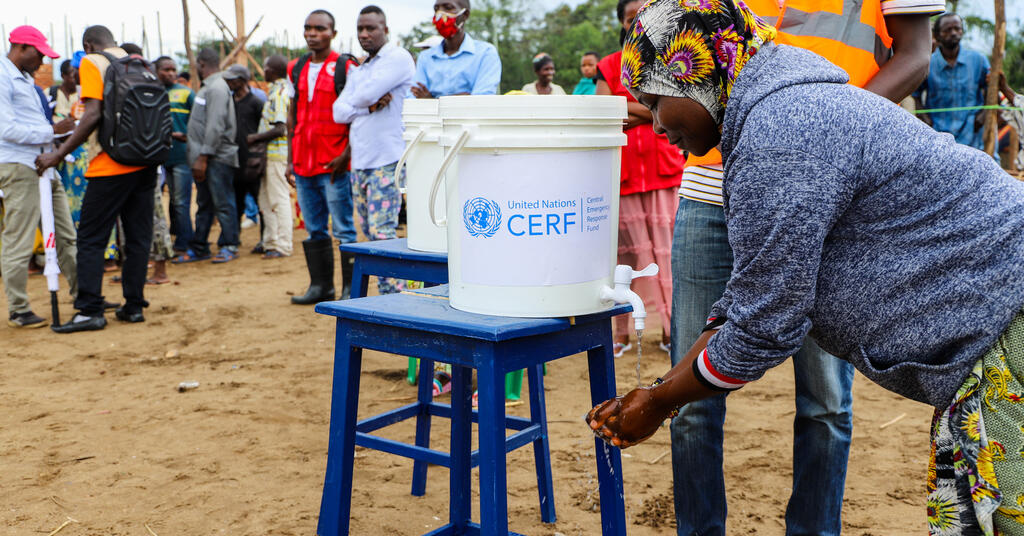DON'T MISS ANYTHING!
Subscribe to our newsletter
Get the latest news, personalised insights, and must-read stories from Jafriq Radio straight to your inbox with our free newsletters.
Listeners:
Top listeners:
LISTEN NOW: JafriQ Radio Live On Jafriq Radio


Burundi, Climate Disaster, IDPs IOM distributes assistance, including money for rent to relocated displaced people at Kigaramango IDP camp. Displaced people have been living in this camp since the floods in Gatumba in April 2020 2022, IDP Camp, Kigamarango
[ad_1]
As the global funding outlook remains grim, the United Nations today released US$100 million from the Central Emergency Response Fund (CERF) to address critical underfunding of humanitarian emergencies across 10 countries in Africa, the Americas, Asia and the Middle East.
“In far too many humanitarian emergencies, a lack of funding prevents aid agencies from reaching people who need life-saving assistance, and that is heart-wrenching,” said Joyce Msuya, Acting Under-Secretary-General for Humanitarian Affairs and Emergency Relief Coordinator. “CERF funding is an emergency cash injection of last resort to avert the worst and save lives when other humanitarian funding is inadequate. We urgently need increased and sustained donor attention to these underfunded crises.”
More than one third of this new funding from CERF, which is managed by the Office for the Coordination of Humanitarian Affairs (OCHA), will support aid operations in Yemen ($20 million) and Ethiopia ($15 million), where people are grappling with the combined impact of hunger, displacement, diseases and climate disasters.
The new funding package will also support humanitarian operations in countries beset by years of conflict and displacement, exacerbated by climate shocks and stresses. They include Myanmar ($12 million), Mali ($11 million), Burkina Faso ($10 million), Haiti ($9 million), Cameroon ($7 million) and Mozambique ($7 million). Countries responding to El Niño-induced drought and flooding, such as Burundi ($5 million) and Malawi ($4 million), are also included.
Recognizing climate change as a key driver of humanitarian needs, part of this allocation will promote climate-smart humanitarian action supported by CERF’s Climate Action Account.
This is CERF’s second allocation for underfunded emergencies this year, following the release of $100 million in February for seven countries.* However, the combined $200 million released this year for poorly funded humanitarian crises is the lowest amount in the last three years, underscoring the growing gap between humanitarian needs and the donor funding CERF receives to meet them.
This year, the humanitarian community is seeking some $49 billion to reach 187 million of the most vulnerable people in crises worldwide. To date, only 29 per cent of this funding has been received, leaving a $35 billion gap.
*CERF allocates funding for underfunded emergencies twice a year. The previous $100 million, released in February, supported humanitarian operations in Chad, the Democratic Republic of the Congo, Honduras, Lebanon, Niger, Sudan and Syria.

Get the latest in African news delivered straight to your inbox
Almost finished…
We need to confirm your email address.
To complete the process, please follow the instructions in the email we just sent you.
There was a problem processing your submission. Please try again later.
Note to Editors:
CERF is one of the fastest funding instruments available to help people affected by crises.
Managed by OCHA on behalf of the UN Secretary-General, CERF enables timely, effective and life-saving humanitarian action by UN agencies and others to kick-start or reinforce emergency response anywhere it is required. Funding decisions for underfunded emergencies are based on detailed analysis of more than 90 humanitarian indicators and wide consultations with partners.
Since its creation by the UN General Assembly in 2005, and with generous contributions from
135 Member States and observers, as well as other donors including private individuals, CERF has assisted hundreds of millions of people with $9.3 billion across more than 110 countries and territories. This includes $3.2 billion for underfunded crises, including this latest allocation. CERF has an annual funding target of $1 billion.
CERF is the leading global humanitarian funding tool for responding to climate-related humanitarian emergencies. To strengthen this function, CERF launched its Climate Action Account at COP28, offering a quick, efficient and impactful avenue for climate-related humanitarian finance. It aims to assist the world’s most vulnerable communities facing the consequences of the climate crisis, including through anticipatory action and life-saving projects that also build people’s adaptation and resilience.
For further information, please contact:
In New York, Eri Kaneko, kaneko@un.org, +1 917 208 8910
In Geneva, Jens Laerke, laerke@un.org, +41 79 472 9750
[ad_2]
Written by: jafriqradio
africa Aid and Assistance Business current events economy news Politics sports trade travel
Get the latest news, personalised insights, and must-read stories from Jafriq Radio straight to your inbox with our free newsletters.